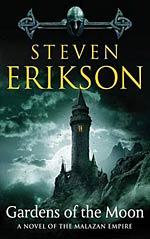
![]() deimosremus
deimosremus
7/16/2021
![]()
Gardens of the Moon, and the series it belongs to is a property I've been aware of for a few years now. Reading praises of its highly fleshed-out worldbuilding, plot and character complexity and inventiveness made it a work that, though not top-priority on my reading list, was one that I inevitably was going to seek out and read. Upon looking at some other reviews, I found that its reception was mixed, but mostly positive, so my expectations going in were cautious, but relatively high, considering all the words of admiration aimed at it.
In short, those things it's praised for? It doesn't succeed with any of them, aside from having a very detail-oriented sense of world-creation, but more on that later. If I were to sum up my thoughts on the first entry into the Malazan series, it's that it's a rather digestible epic fantasy at its core, perhaps more ambitious in scope than most popular titles within the past decade, but it's so stylistically and conceptually unremarkable that it's rather difficult to admire Erikson's emphasis on the world he so meticulously creates. It feels like an overdrawn retread of Glen Cook's The Black Company or Zelazny's Chronicles of Amber, with its cast of morally gray mercenaries, powerful mages, soldiers, rogues and empresses caught in a power struggle -- a story that's hard to care about when all the characters are lukewarm, utilitarian personality-voids. And with character titles like "Lord of Shadows" and location names like "Shadow Realm" and "Whore Street", I'm hesitant to call it creative. Structurally, it also feels like a collection of scenes, rather than a cohesive whole with forward momentum.
I've said this in past reviews, but as I've done a dive into fantasy fiction over the past couple of years, with an effort to represent its various sub-genres and styles (Epics, Sword & Sorcery, Literary, Low Fantasy, Science-Fantasy, Heroic Fantasy, Juvenile Fantasy, Surrealism, etc), to see what I enjoy the most, most books fall into one of two camps: either it prioritizes worldbuilding, and in doing so, crafts a detailed world meant to be fully believable within the story's logic or our own logic (which, in my opinion, can defeat the purpose of fantasy)... or it prioritizes the language and style, and the prose in which the world, its concepts and feelings are revealed as more deliberate and artistic. Rarely, books excel at both, but I've come to favor the latter, as worldbuilding, impressive as it may be at times, can be an overbearing force in a book, drowning out any stylistic flavor or driving ideas that it might've had otherwise.
Gardens of the Moon is an egregiously detailed book, and I think this is where complexity is confused with detail. The plot that it tells, the character motivations in play, and the concepts, themes and political aspirations it is trying to convey, are simple to understand, despite the 'en media res' approach of dropping the reader into the middle of a seemingly complicated situation. But the detailed worldbuilding is front and center here, padding out the narrative and bombarding the reader with lore, terminology and throwaway characters that don't carry much weight when the world Erikson builds is so derivative of the homogenous imagery and ideas found in Role Playing Games... Which, given the origins of this book initially evolving out of an RPG campaign/setting, makes a lot of sense. I can see the appeal in this to a degree, since RPGs are only getting more popular, and as such, Malazan could be considered a timesink crowd-pleaser, but it's not fun to read all the fantasy-babble (e.g.; "I am Pran Chole of Cannig Tol's Clan among the Kron Tlan" is the kind of sentence that rears its head multiple times every page) and having the promise of a challenging Fantasy story, I found it to be a failure at being one.
Unremarkable and overwrought.
http://www.nathanandersonart.com/